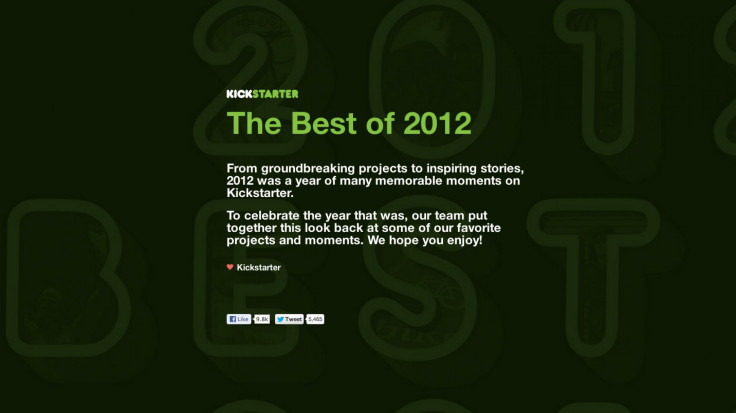Kickstarter Projects Collect $274M In 2012, But Has The Crowdfunding Titan Peaked?

Let's face it: Nobody really took crowdfunding seriously until Kickstarter came along in 2009. Since then, the platform has launched many successful and disruptive ships across several industries, particularly technology and the arts. To honor what was quite possibly its best year yet, Kickstarter created a Year In Review page to show off its statistics, trends and biggest achievements.
Here are the numbers you need to know: In 2012, 2,241,475 people (up 134 percent from 2011) pledged $319,786,629 (up 221 percent from 2011), which successfully funded a grand total of 18,109 Kickstarter projects (an average backing rate of $606.76 per minute). More than $319 million was pledged, but only $274,391,721 million was collected; unfunded projects do not charge customers their pledged monies.
Roughly three-fourths of all backers in 2012 (570,672 people) backed two or more projects on Kickstarter, while a generous one-fourth of the Kickstarter faithful in 2012 (50,047) backed 10 or more projects. Most impressively, Kickstarter recorded 452 people that backed more than 100 different projects on their platform last year.
These people weren't just centralized to one coast or even one country: In fact, 90 percent of the world's countries -- 177 of them, to be exact -- backed a Kickstarter project last year. That's a pretty impressive reach for a three-year-old Internet company.
Of the projects funded, the music category claimed the highest number of funded projects (5,067), while the gaming category accumulated the most capital ($83 million) by the most pledges (1,378,143) in 2012. A total of 17 projects raised at least $1 million.
Luckily for Kickstarter, funding wasn't centralized to those two categories; five other categories on the site, including art, film, music, publishing and theater, all enjoyed more than 1,000 funded projects each.
Kickstarter also announced some other interesting statistics about its funded projects, which went on to become New York Times bestsellers, Oscar nominees, Amazon hits and space cadets. They ranged from the awe-inspiring (open-source music) to the delightfully strange (banana piano, squirrel census or pizza museum, anyone?). They lit up Burning Man, and they let journalists like us cover events around the world. They filled our movie theaters (63 movies this year were Kickstarter-funded) and even comprised 10 percent of all Sundance films, with four Kickstarter-funded films even winning top prizes.
As a website, Kickstarter enjoyed 709 million page views (up 279 percent from 2011) and 86 million unique visitors (up 252 percent from 2011). The site gained a great deal of popularity in 2012, but one question remains: Has Kickstarter peaked?
Barring some wild, unforeseen circumstance, statistics don't suggest Kickstarter will meet any sort of major decline anytime soon. Still, anything goes in the Internet world; one wrong move, and users will turn on you faster than you can say "MySpace."
The fact is that only about 43 percent of all submitted projects to Kickstarter raise the funds they need. For some time, Kickstarter suffered from Pebble Watch syndrome, a condition caused by a project raising a great deal of money and then not following through and delivering to customers.
On Sept. 20, Kickstarter's founders, Perry Chen, Yancey Stricker and Charles Adler, decided to do something about the company's precarious condition. The team announced a number of changes to "reinforce that Kickstarter isn't a store," which ruled out any projects using product simulations or renderings in their video pitches to demonstrate what their future product would look like or do.
"Products can only be shown performing actions that they're able to perform in their current state of development," the Kickstarter founders wrote on their blog.
The move made sense for Kickstarter -- many had already begun taking advantage of their popular platform, raising funds but never delivering or simply using fraudulent material to make false promises. Unfortunately, Kickstarter's policy change also affected many honest engineers that cannot so easily afford to build fully capable versions of their product or service to show off for the Kickstarter faithful in a video; after all, a common reason for approaching a platform like Kickstarter is to raise the money needed to build out those ideas in the first place.
As a result, Kickstarter was forced to turn away many projects in the waning months of 2012, leaving a bitter taste in the mouths of those companies and their friends. Making matters worse, the company continually refuses to respond to numerous press inquiries, making the company's business seem that much more closed-off and unfriendly.
Since the "Kickstarter Is Not A Store" policy change, the site has not enjoyed a major success story akin to Ouya, Pebble, Double Fine or otherwise. It may be a coincidence, or it could be the start of a trend, but what happens (or doesn't happen) to Kickstarter over the next several months will be very telling about its policy change.
Kickstarter enjoyed a great deal of success in 2012, truly introducing "crowdfunding" into the public vernacular, but the company leaves many questions unanswered going forward. Can it achieve continued success, even with its tightening rules around marketing? And why so secretive? As a community tool, Kickstarter leaves much to be desired as a friendly company. It will be interesting to see, this time next year, how many million-dollar projects Kickstarter can boast.
© Copyright IBTimes 2024. All rights reserved.






















